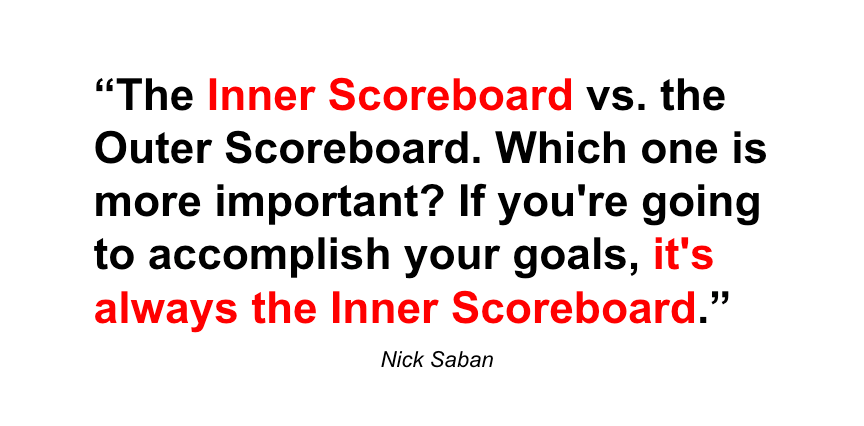- The Process
- Posts
- A Powerful Life Framework
A Powerful Life Framework
How world-class people measure success

Welcome to The Process. Every week, I share lessons and insights from world-class people that make you better.
If you’re not subscribed, subscribe below and join 21,000+ leaders.
Now, onto Issue 47.
Brought to you by: MGMT Playbook
If you manage or lead people, I can’t recommend the MGMT Playbook highly enough.
My friend Dave Kline shares practical management insights from 20+ years of experience building and leading teams, including many years in leadership roles at Bridgewater Associates.
If you’re interested in management or leadership, subscribe below and give it a shot:
|
The Inner Scorecard
Warren Buffett is worth around $115 billion at the time of this writing.
As an investor, he’s quite literally in the business of money.
His job is to turn $1 into several multiples more.
Given that, you’d think his measure of “success” would be simple.
More money = more success.
But you’d be wrong.
Buffett lives by a principle called The Inner Scorecard that he learned from his father.
It’s the same principle Nick Saban — the Alabama football coach who’s won 7 national titles — measures his success by.
So, what is The Inner Scorecard and how can you apply it to your life?
That’s the question we’ll explore today.
Two Ways to Measure Success
There are two general ways to measure success.
The Outer Scorecard
The Inner Scorecard
Let’s start with the first.
The Outer Scorecard is how most people measure success.
Fame
Money
Status
Influence
Accolades
Recognition
Achievement
These are based on extrinsic motivation.
The Outer Scorecard is fickle.
It’s defined by what the world thinks.
It’s outcome-focused.
Outcomes are mostly out of your control.
Playing by this scorecard is a fool’s game.
The Inner Scorecard is how world-class people measure success.
Effort
Values
Principles
Standards
Excellence
Commitment
Performance
These are based on intrinsic motivation.
The Inner Scorecard is reliable.
It’s defined by what you think.
It’s process-focused.
The process is entirely within your control.
While you don’t control outcomes, you do control your daily actions. These move you closer to or further from your goals.
The Inner Scorecard has simple principles:
Live in the present
Focus on the process
Ignore all external voices
Perform to your standard
Forget about the outcome
Nothing else matters.
Buffett didn’t invent this concept — it’s at least as old as the Stoic philosophers, even if they didn’t call it this — but he is most-often credited for it today.

In recent years, The Inner Scorecard has become popular in sports and business.
Saban calls it the “scoreboard.”
He’s far from the only sports coach who subscribes to the concept.

So, we know what the Inner Scorecard is.
They key question now: How do you develop yours?
Developing your Inner Scorecard
Your Inner Scorecard is highly individual.
It’s much more art than science.
But here are 3 questions to help guide you:
Question 1: What are my core values?
Your values drive your behavior.
Your behavior drives the Inner Scorecard.
Examples of values:
Courage
Integrity
Service
Ownership
Your values can be anything, but they shouldn’t loosely held.
Your values should be the bedrock principles you live your life by.
Clarifying them is a good first step.
Question 2: What is my personal standard?
Your “standard” is the unwavering commitment you make to how you live your life.
Think of sports teams.
They all:
train
practice
lift weights
watch film
play games
So what separates elite teams from poor teams?
The standard at which they do those things.
Now, think of companies.
They all want to:
make money
be No. 1 in their industry
dominate their market
build a great culture
So what separates them?
Consistently living to their standard.
Your standards guide your Inner Scorecard.
Question 3: How good do I want to be?
We all need to decide.
Are we good with “good enough?”
Or do we want to maximize our potential?
Good. Great. Our best.
Which one is it?
How we answer will influence our mindset, habits and behaviors.
Here are a couple practical examples of the Inner Scorecard.
Let’s say you sell cars.
Outer Scorecard measures:
Make $350,000 this year
Win top salesperson award
Get promoted
Inner Scorecard measures:
Improve sales skills every day
Obsess over every customer
Make each sales call great
Now, let’s say you’re a startup CEO:
Outer Scorecard measures:
Raise $50 million
Be on Forbes 40 under 40
Win “best new startup” award
Inner Scorecard measures:
Make your pitch amazing
Build a fantastic business
Relentlessly execute every day
See the difference?
It’s subtle yet extremely powerful.
Summary
Let’s recap.
There are two general ways to measure success:
The Outer Scorecard (extrinsically motivated)
The Inner Scorecard (intrinsically motivated)
World-class people tend to live by their own Inner Scorecard.
Does this mean the Outer Scorecard measures don’t matter?
Not at all.
In sports, if you don’t win games, you get fired.
In business, if you don’t make money, you don’t have a company.
Outcomes are important.
But here’s the key mindset shift:
The Inner Scorecard gives you the best chance to achieve the Outer Scorecard.
Be relentless about measuring success by what you can control.
How you measure success will determine how successful you’ll be.
I’d love to hear from you
What’s your biggest takeaway from this issue?
Reply to this email and let me know.
I personally read every email.
Thanks for reading.
See you next Sunday.
Cheers,
Teddy
